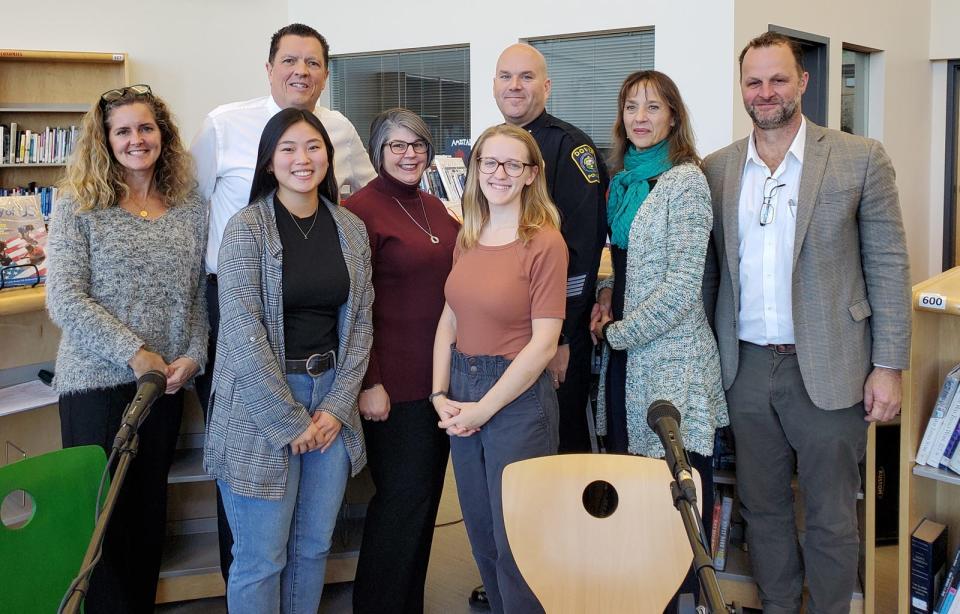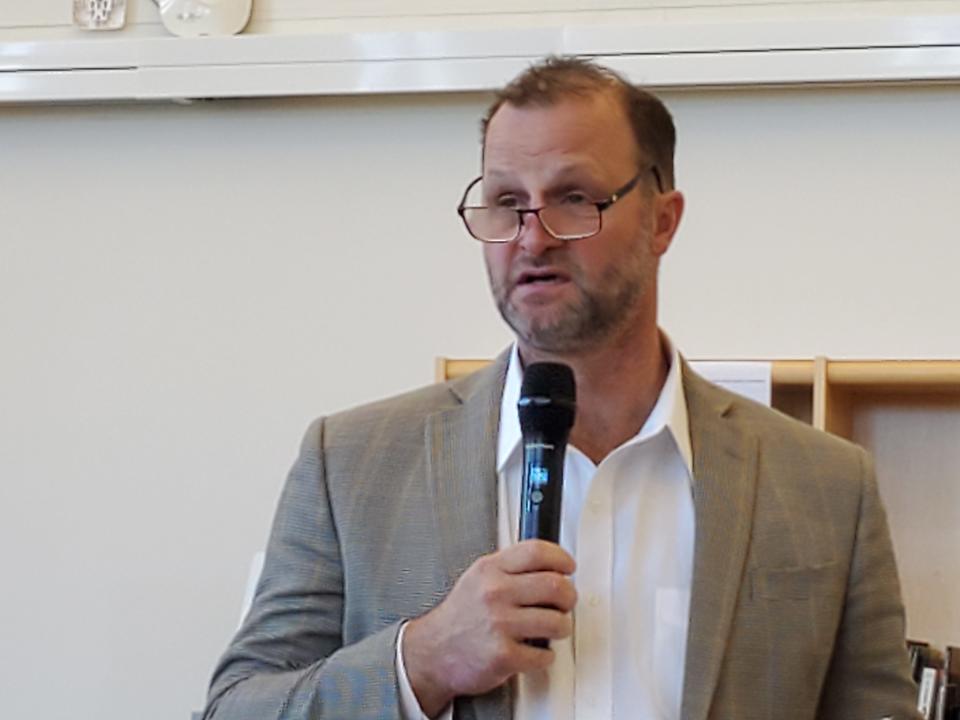Dover's 6-part plan for better mental health unveiled: 'We have to do better'
DOVER — Suzanne Weete is a leader for Community Partners, and she describes herself as a mom who got involved because she saw a problem with mental health.
"As a mom, I am passionate about my kids," she said. "So if I didn't know the risks and the warning signs, how can I expect anyone else to? We need to educate everyone. I want to teach kids' peers, teachers, professors, business owners and other parents to recognize emotional distress and to know what to do to help. If you saw someone with a broken arm, or who was having a heart attack, you would help. This is the same thing."
Weete was part of a panel discussion at Dover High School Saturday. The topic was a Dover Mental Health Alliance task force's draft report with six objectives and more than 100 initiatives to address mental health with a community-wide approach.

Weete talked about personal responsibility and the need for everyone to involve themselves and help change the culture and stigma surrounding mental health.
Saturday's panel was moderated by Laura Knoy, known for her long career with New Hampshire Public Radio. The panel included Weete, community education and engagement manager with Community Partners; Christopher Kozak, chief executive officer of Community Partners, Christine Boston, assistant superintendent for student services with the Dover School District and William Breault, Dover's police chief. Providing assistance was Max Latona, director of the Center for Ethics in Society at Saint Anselm College, along with Anna Gendron and Hannah Beaudry of the center.
How Dover's mental health project started
The mental health crisis affects so many nationwide, and it has been exacerbated during the coronavirus pandemic, panelists said.
In Dover, the pain is acute for many families and students associated with Dover High School's Class of 2022.
The Class of 2022 lost three students to suicide in three years, and students at DHS began their own mental health initiative, demanding a seat at the table to help find ways to support each other. Thirty high school students and 15 teachers received youth suicide prevention training as part of NAMI-NH’s “Connect” Youth Suicide Prevention program. The program teaches the risk and factors of a mental health crisis, suicidal ideation and the steps to keep a suicidal person safe. The Dover Mental Health Alliance and NAMI-NH have been partners in helping equip the students with the resources they need.
Attendees at Saturday's event walked by a powerful photo display by artist Lynda Cutrell as they headed to the library at Dover High School. Called 99 Faces, the portraits depict people with schizophrenia, bipolar disease and other illnesses and the people who love and support them.

The draft report of the Dover Mental Health Crisis Services in 2022 plan was formulated by the Dover Mental Health Alliance, with the Center for Ethics in Society at Saint Anselm College, and many other city partners, including police, fire EMS, mental health services, the City Council and other city department heads.
"Dover has some of the finest leaders, who care deeply about mental health," St. Anselm's Latona said. "We were tasked with identifying these initiatives and we feel very strongly that the recommendations reflect the best data available.'
Dover's 6 strategic objectives for mental health
Six objectives and over 100 initiatives specific to city departments and schools are included in the report. Some can be implemented fairly quickly and others may take years to develop. The goal is to get everyone to buy in, to make a cultural change, and to create a positive direction going forward.
The strategic objectives are:
Expand education for the Dover Community about the importance of mental health, the prevalence of mental illness, and the availability of mental health resources in order to reduce stigma, and promote efforts for treatment and recovery.
2. Expand mental health support training for city leadership and staff in order to improve the quality of mental health crisis care.
3. Facilitate communication between mental health service partners and social service agencies for better understanding of agency limitations, coordination of care, referrals and follow-ups.
4. Conduct better tracking of mental health related statistics in order to better adapt to both staff and community mental health needs.
5. Provide added support for mental health care related positions, as well as mental health support for city-funded staff.
6. Establish better facilities for mental health crisis care.
What panelists say about mental health in Dover
Asked what motivated the panel, Breault said Dover police field mental health related calls every day.
"We are seeing an increase at the police station and emergency services," he said. "People are suffering, and we need better mental health services because the numbers continue to go up."
Breault acknowledged a police response and emergency room visits are not always the best answer.
"We have to do better," he said.
Boston said schools are seeing the same increases in mental health needs, and many involve suicidal ideations.
"You can't learn when your basic needs are not being taken care of," Boston said. "I liken it to a river. We may be able to pull you out when you get downstream. We want to get to kids before they fall in the river."
Questions from the audience included about how the new 988 exchange works, about insurance coverage and about ways to get involved.
More:New NH law requires 988 National Suicide Prevention Lifeline on student ID cards
"The Dover Mental Health Alliance is volunteer," Weete said. "We offer free trainings that only require your time. We have many groups and efforts where we would love more volunteers. There are a lot of ways to get involved."
"Dover has been a wildly successful experiment," Kozak said. "I'd like to see us in every school. I like this as a model for the county, for the state."
The plan will be presented to the City Council Nov. 30 for councilors' input and possible adoption. Saturday's meeting was a chance for the public to hear the plan and to ask questions, both at the meeting and through a livestream. Latona said Saturday's discussion will be reviewed and ideas could be added to the report.
"We will be taking input throughout the next week or so," Latona said. "We want to hear what you have to say."
Weete said the report was created by committed people working together.
"I don't want to see this end up on a shelf," she said. "I want us to work with every city department. I know much of this will take years, but let's get started."
For information or to offer input, email dovermha@gmail.com.
This article originally appeared on Fosters Daily Democrat: Dover NH 6-part plan for better mental health unveiled

